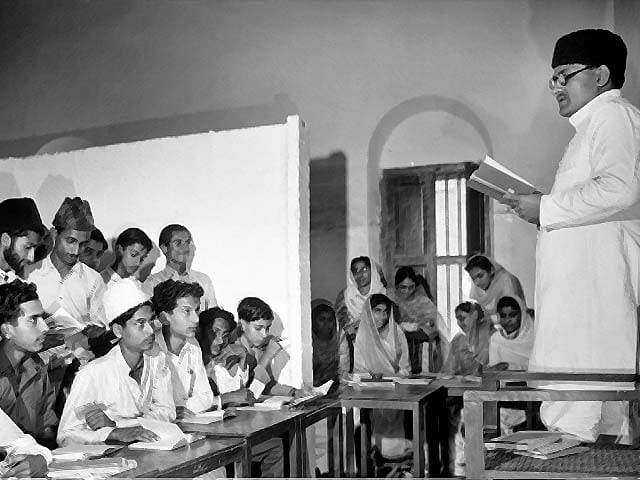This two part series explores ways to improve the Pakistani research and university landscape in light of Federal Minister for Science and Technology Fawad Chaudhry questioning why Pakistani universities have been unable to help in the fight against coronavirus. Read Part II here.
~
The population explosion is one of the most concerning issues Pakistan is currently facing. While the country has around 220 million citizens at the moment, that number is expected to cross 340 million by 2050. Pakistani institutions, past governments, and those who hold the reins of power have completely failed to curb the country’s population growth. Nonetheless, it is imperative that the state ensures this young workforce is trained so that it can contribute to the local economy and also provide services abroad.
Broadly speaking, the skills and qualifications needed in modern economies can be categorised into two sets: academic and vocational. It is the job of universities to impart academic skills and to engage in research, while vocational skills are generally learned at technical training institutes. Universities will have to lead the way in order to create more valuable human capital. But anyone who has even an iota of understanding with regards to what goes on at major institutions of higher learning in Pakistan will know very well that they are plagued by several pitfalls when it comes to performing this essential duty. Pakistani universities and research institutes face problems of plagiarism, nepotism, ethnic strife, mismanagement, and financial corruption. Hence, change is not possible without a fundamental alteration in our thinking habits, cultural traits and the way we organise our institutions. But before we address these problems we must understand the framework within which most universities operate.
STEM education reform
Majors taught by universities can be categorised as STEM (Science, Technology, Engineering, Mathematics) and non-STEM (Social Sciences, Humanities/Liberal Arts). For foreign workforces and migrants, non-STEM majors have a lesser demand in developed economies and sometimes even in Pakistan. Therefore, STEM majors should be the primary focus of Pakistan’s policymakers at the moment. In general, STEM subjects can be divided into three kinds of categories. The abstraction or difficulty level of subjects increases from type C to A, but job availability decreases.
Category A: Pure Mathematics, Theoretical Physics/Chemistry/Biology, Theoretical Computer Science/Artificial Intelligence, Cognitive Science, Theoretical Linguistics
Category B: Engineering Sciences, Material Sciences, Applied Mathematics & Statistics, Applied Physics/Chemistry/Biology, Applied Computer Science, Bioinformatics, Machine Learning, Medical Research
Category C: Electrical/Mechanical/Mechatronics/Software Engineering, IT, Business Informatics, Data Analytics, Accounting, Medicine, Agriculture Sciences/Technology
Category A subjects are the holy grail of academic research and are more fundamental and research intensive in nature. Pure mathematics and theoretical physics are the stars of this category. These are very rigorous and academically prestigious subjects, and graduates of these are required to do PhDs and post-doctorals for an advancement in their careers. The major goals of these areas is to increase human understanding of different kinds of natural and mathematical phenomena and to do theoretical research in other areas. This is where the creation of new kinds of scientific knowledge happens. However, only a few jobs in the industry and government sector exist world over for such specialisations (unless one branches out towards the more applied side), and only a handful of individuals get permanent jobs in academia or in research centres. Some later go on the become professors of theoretical or practical sciences.
Category B is essentially a mix of both categories A and C. In the larger Western industrial groups, specialised high-tech small and medium enterprises (SMEs) and applied research centres, these specialisations are used in high-end research for applied goals, such as building innovative materials for industrial use, mathematically model engineering problems, studying the spread of new viruses or finding cures for diseases. Knowledge creation in these areas has more practical and short-term applications. Usually one has to have completed a PhD in order to find work in such applied research areas. It will not be an exaggeration to say that Pakistani universities are severely lacking when it comes to both category A and category B, since both are quite abstract to master. But sadly, these two categories seem to be out of the league of our professors and university graduates, for now.
Category C subjects are used for the development of technical products, different kinds of commodity production and the creation of information services and software applications. Pakistani universities should focus on these categories for manpower export and for the development of the national economy. Industries of different kinds, government sectors and international SMEs usually require graduates of these majors who can do hands on technical work. Pakistani graduates need to focus on these subjects which are mostly application oriented in nature and are not very abstract to grasp. A quick search on Google and different job search engines will show that there are tonnes of such jobs available in developed economies, and even in developing countries. A basic B Sc or M Sc degree, combined with marketable technical skills and relevant work experience, will be all that is required for such jobs and will help the graduates to develop the local economy or to leave the country altogether for greener pastures. Such workers can always come back to the home country with advanced knowledge and experience to train the next generation of graduates and open up innovative businesses.
Currently, Pakistani universities are lacking in the quality of both research and teaching. High technology, or even basic level, research and development is not a strength of Pakistani universities, and several of them only specialise in producing junk papers and research. Since the early 2000s, the Higher Education Commision’s (HEC) drive to focus on increasing the rankings of universities by relying on research of dubious quality has damaged the teaching standard, thus putting the future of students in peril. In the future, more attention should be paid on the quality of teaching and hiring of competent lecturers who are passionate about their field of study. In the short term, and for the economic future of their hapless graduates, universities must complement degrees with skills-based short courses which have to employ state of the art software and teaching methods. Coordination with the local industry and multinational companies should be established in order to know more about the skills they require.
The world will need qualified and competent knowledge-based workers in the coming years. There will be tonnes of mid-level engineering, information technology (IT) and applied sciences jobs to be filled in the coming decades, both locally and globally. Through a concerted government strategy which focuses on advanced technical training, Pakistan can mould the young workforce to its advantage.



COMMENTS
Comments are moderated and generally will be posted if they are on-topic and not abusive.
For more information, please see our Comments FAQ